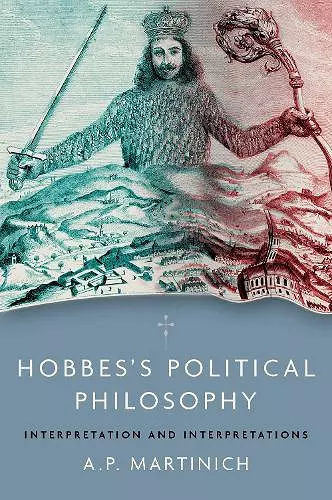Hobbes's Political Philosophy
Interpretation and Interpretations
Format:Hardback
Publisher:Oxford University Press Inc
Published:25th Oct '21
Should be back in stock very soon

Thomas Hobbes, the greatest English political philosopher, argued that human beings needed government in order to save their lives from being "solitary, poor, nasty, brutish, and short." They form governments by making a contract with each other to support a sovereign, to whom they give their right of governing themselves. In other words, government is artificial and not natural to human beings. Hobbes's arguments are formidable, but often unacceptable. For example, few people believe Hobbes's claim that the authority of their government is unlimited. Government needs to be limited in some way, such as a system of check and balances, to prevent tyranny. Identifying exactly where Hobbes went wrong is difficult, but also illuminates the truth about government. Hobbes's Political Philosophy: Interpretation and Interpretations aims to clarify Hobbes's positions by examining what Hobbes considered a science of politics, a set of timeless truths grounded in definitions. A.P. Martinich explains this science of politics, examining Hobbes's views on the laws of nature, authorization and representation, sovereignty by acquisition, and others. He argues that in addition to the timeless science, Hobbes had two timebound projects. The first was to eliminate the apparent conflict between the new science of Copernicus and Galileo and traditional Christian doctrine by distinguishing science from religion and understanding Christianity as essentially belief in the literal meaning of the Bible. The second was to show that Christianity is not politically destabilizing by appealing to biblical teachings such as "Servants, obey your masters," and "All authority comes from God." In examining Hobbes's views on political philosophy, Martinich gives a comprehensive overview of Hobbes's historical context and puts his arguments in dialogue with other interpretations of Hobbes's philosophy, drawing on the work of scholars such as Jeffrey Collins, Edwin Curley, John Deigh, and Quentin Skinner. This new interpretation of Hobbes's work will be of interest to philosophers interested in the history of philosophy as well as those interested in political philosophy, theology, and moral philosophy.
Ruth Boeker's book presents a very solid and very original discussion of Locke's theses, as well as a reassessment of the debate they have generated...The analytical orientation of the work, hardly surprising for such a subject, allows a clarification of the theses and the debates, according to a rigorous perspective, without being neither too dry nor too arduous. * Eric Marquer, Archives de philosophie *
Without developing a new interpretation of the philosophy of Hobbes, the work offers an interesting synthesis of the research of an eminent specialist, through a thoughtful or reflective practice. * Éric Marquer, Archives de philosophie *
Martinich succeeds in decisively shifting the burden of argument to advocates of deflationary or subversive interpretations of Hobbes'sengagement with religion. General readers looking to situate Hobbes's political philosophy historically should find Martinich's Hobbes more plausible than atheistic interpreters', but also more interesting because Martinich's Hobbes can speak to religious motivations today. For Hobbes specialists, cover to cover study of Martinich's book is essential. * S. A. Lloyd, University of Southern California, Journal of the History of Philosophy *
It is impossible in a short review to do justice to this varied and interesting collection * Jeffrey Collins, The Review of Politics *
ISBN: 9780197531716
Dimensions: 166mm x 245mm x 26mm
Weight: 594g
304 pages